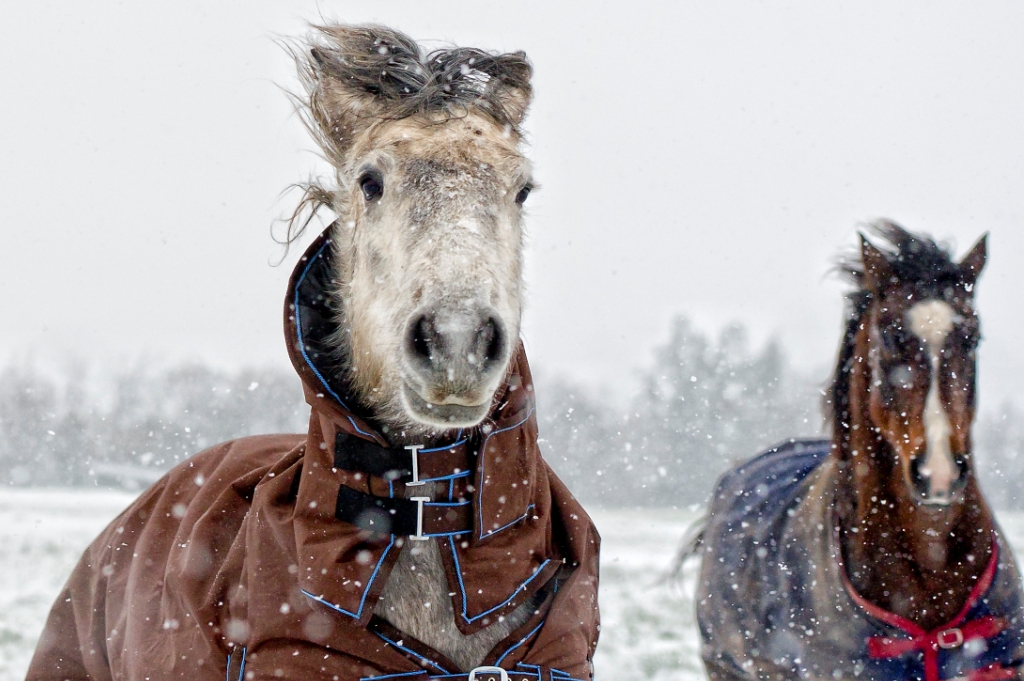
The cold wintery weather is now well and truly with us and likely to remain for several months. This week we’ve experienced the usual unpredictable mix of snow, sleet, rain, harsh winds and cold, dank days. And mud is part of daily life for horses and horse owners alike.
Horses can happily live outside all year around, but some additional care during winter is essential
Here is some straightforward guidance to help ensure a trouble-free winter for your horse or pony.
For horses kept in fields:
- Ensure adequate shelter – this can be as simple as the natural shelter afforded by trees and hedges, or a constructed field shelter. A field shelter needs to be robust, in good repair and securely anchored to the ground to ensure stability in the event of stormy winds. Make sure all the herd can use the shelter to minimise bullying in the group. Remember, horses may prefer not to go inside a shelter, using it instead as a solid windbreak.
- Haircoat grows and adapts naturally for colder weather, so grooming should be kept to a minimum to avoid depleting the horse’s essential natural oils and undercoat.
- Rugs are needed if there is inadequate shelter, or for clipped, older or ‘cold’ horses. A rug must fit properly, be of appropriate weight and be checked regularly (including underneath, as skin issues can develop rapidly). Remember, weather and temperature vary daily throughout winter and over or under rugging causes problems by preventing natural coat adaptation.
- Grass growth and its nutritional value are limited in winter and mud, frost and snow reduce this further still. Supplementary hay and feed is important.
- Forage is important for warmth as well as calories. Digestion within the gastrointestinal tract generates heat, keeping the horse warm. Hard feed is usually important for calories and supplementary vitamins and minerals. Please do select a feed appropriate for your own horse.
- Water is vital. In winter, a horse consumes more hay which contains much less moisture than grass, hence more water needs to be freely available. Check buckets and troughs regularly to ensure they are not frozen. A mineral or salt lick is useful to encourage water consumption.
- Mud is a nuisance for everybody. If your horse lives out, then the legs are likely to be wet and muddy for long periods. Check for skin lesions (mud fever) and act quickly before this becomes difficult to manage. Slippery, boggy mud especially at field gates can cause tendon injuries to horses – and their owners!
Stabled horses require similar care in winter with a few differences:
- Keep stables as dust free as possible. Use dust-free bedding and good quality hay. Long periods of stabling are more likely to cause coughs, allergies etc. and minimising dust is a must.
- When coming in from a field muddy, be careful when washing legs. Some horses do not cope well with this and it may be better to allow the mud to dry and be brushed off. If washing off, it is best to dry the legs after. Treat any signs of mud fever promptly to hopefully prevent it becoming a bigger issue.
- Just as with field-kept horses, make sure rugs are well-fitting and an appropriate weight. These will usually need to be changed between turn out and stabling.
- Make sure clean water is available in the stable. Automatic drinkers do freeze, even with lagged, insulated pipes, so monitor them closely.
- Forage is important for feed, generating heat from digestion and to alleviate boredom in the stable. Adopt strategies to make this last as long as possible, including trickle feeding or double netting. However, be certain not to allow over consumption as this leads to other problems.
- Give hard feed appropriate to work levels, remembering to adjust quantities if the weather (or other circumstances) prevent exercise. Muscle disorders, such as ‘Tying Up’, are more commonly seen in winter and can be related to inappropriate exercise and feed combinations. This can be mild and show as muscle soreness and a stiff action, or more serious, presenting as inability to move, sweating and hard, painful muscles.
- Common sense when riding is always important. Warming up and cooling down are even more important in cold conditions and help prevent chills and associated illness.
It is important to look after yourself as well as your horse in winter. Prior planning, both before the colder weather and for daily care, helps make things easier. Seemingly obvious, the following points are nevertheless worth remembering as we can all get caught out from time to time:
- Being cold and wet is miserable. So, in addition to a warm, waterproof coat consider waterproof overtrousers or chaps. Several pairs of gloves, so they can be changed if they get wet, and a warm hat are a must. Check your boots fit well and have good gripping soles for those squelchy, muddy gateways.
- Padlocks and gate catches can quickly freeze up so remember the de-icer. Nothing is more annoying than not being able to access the yard or field once you’ve struggled to get there.
- Have a mallet handy to break ice in water troughs and buckets.
- Remember your torch and ensure the batteries are fresh or charged. Keep the torch somewhere warm when not in use so the batteries don’t drain so quickly – repeatedly leaving a torch in a freezing 4×4 overnight will quickly render it useless.
- Keep your mobile phone charged, warm and dry in an inside pocket. You’ll want to have plenty of charge if there’s an emergency. And know the post-code and road name where your horse is kept.
Lastly, do remember – it’s only a few months until spring when we can enjoy warmer, longer days and lovely green countryside!
If you have any concerns or questions regarding good winter care or healthcare for your horse or pony, please do contact us at 01462 414008 or at office@ballingerequine.com.






